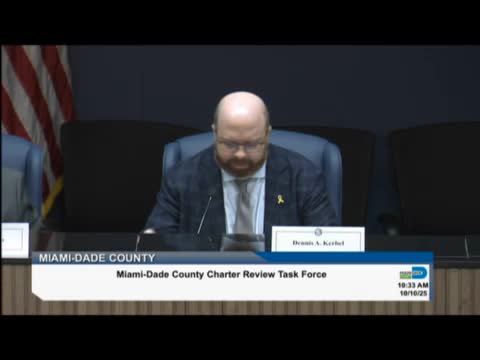Miami‑Dade charter task force weighs raising commissioner pay, considering independent salary commission
Get AI-powered insights, summaries, and transcripts
Subscribe
Summary
A Miami‑Dade County Charter Review Task Force spent its meeting debating whether to raise commissioner pay by adopting the state salary formula or creating an independent salary commission. Members agreed to defer final action and asked attorneys to draft a revised proposal; a regional listening session was scheduled for Oct. 27.
At a Miami‑Dade County Charter Review Task Force meeting, members debated whether to change how county commissioners are paid and whether to add or change term limits, focusing principally on two alternatives: adopt the state compensation formula if commissioners pledge full‑time service, or create an independent, binding salary commission to set pay going forward.
Why it matters: Miami‑Dade is the state’s largest county and — under its charter — still lists commissioner compensation as $6,000 a year unless the charter is amended. Task force members said that figure, set in 1957, no longer reflects the time demands on commissioners and that voters have repeatedly rejected previous salary changes. The group discussed options intended to make any change more politically palatable to voters.
The discussion centered on two lead options in the task force packet. Item A would apply the state compensation formula — staff pointed out that, under that statutory formula and the Office of Economic and Demographic Research calculations discussed at the meeting, a full‑time commissioner who forgoes outside employment would be paid roughly $123,781 annually. Carlos Maxwell of the Office of Management and Budget told the panel that the compensation chart in the packet is compiled from income filings made to the state: “the filings provided to the state, office of ethics,” and that the chart reflects reported taxable compensation rather than a salary/benefits breakdown.
Commissioner Dennis Moss proposed instead creating an independent, five‑member salary commission that would meet at least annually to recommend a total compensation package (salary plus benefit considerations) for the Board of County Commissioners. Moss said the commission’s decisions would be binding and take effect in the next budget cycle. He said the salary commission should consider cost of living, comparable pay for other elected officials and fringe benefits and recommended a floor of the current $6,000 and a ceiling tied to the state formula. “$6,000 is ridiculous,” Moss said, arguing the job is full time and needs pay that reflects its responsibilities.
Several members backed Moss’s approach as a more politically viable path than placing a straight salary increase before voters. Commissioner Jose Jimenez supported an independent panel but suggested a cap so any commission determination “cannot exceed that salary for non‑charter counties.” Mayor Andre Pierre described canvassing 50 voters in North Miami who told him the current $6,000 is unfair; at the same time many told him they were wary of a raise because of recently increased allowances and benefits for commissioners.
Panel members debated composition of the proposed commission. Moss initially proposed a five‑member body appointed by trusted public figures (for example, the state attorney, chief judge, inspector general and ethics‑related offices were mentioned in the discussion). Board members suggested adding representatives from private or nonprofit sectors to increase community trust and noted a desire for transparent selection and vacancy‑filling rules so replacements are appointed in the same manner as original appointees.
Legal staff reminded the task force that prior ballot measures on this topic had failed multiple times and that there are limits on using public funds to advocate for ballot measures. Task force counsel quoted Florida Statute 106.113, noting that while the statute prohibits local governments from spending public funds to promote ballot measures, “this section does not preclude an elected official of the local government from expressing an opinion on any issue at any time.”
Next steps and actions taken: Commissioners asked attorneys to redraft the independent commission language to reflect amendments discussed at the meeting — including an annual meeting schedule, a $6,000 floor, a state‑formula ceiling and vacancy language — and to circulate a revised draft ahead of the next meeting. Commissioner Moss moved to defer final action and have staff prepare the revised language; the motion carried on a voice vote. The task force also approved a correction to the minutes (changing Mayor Lawson’s listed municipality) and scheduled a public regional meeting for Oct. 27 from 5‑8 p.m. at the North Dade Regional Library (with a November 17 meeting in the chamber set for 9 a.m.).
What remains unresolved: The task force did not adopt final charter language. Members asked for the attorney to present a consolidated draft at the next meeting with the agreed amendments and to consider whether the commission should include additional private‑sector appointees and whether the mayor’s term limit language should be adjusted in parity with any change proposed for commissioners.
The task force deferred the salary‑and‑term limit items for further drafting and review; staff will prepare a revised charter amendment draft and distribute it ahead of the next meeting for further consideration.
